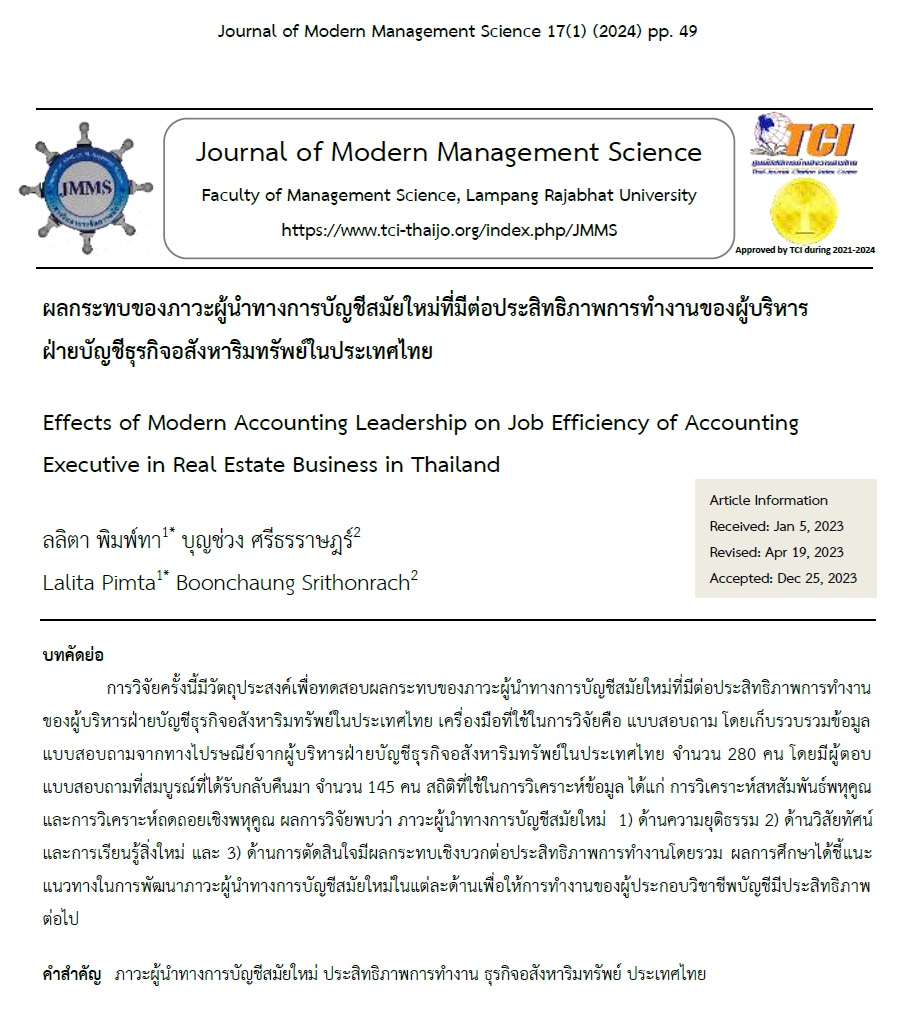Effects of Modern Accounting Leadership on Job Efficiency of Accounting Executive in Real Estate Business in Thailand
Main Article Content
Abstract
This study was aimed to examine the impact of modern accounting leadership on job efficiency of the accounting executive in real estate business in Thailand. The research instrument was questionnaire by collecting the data from the real estate business of the accounting executives in Thailand. The participants were 145 accounting executives around Thailand in this study. The statistics was analyzed into multiple correlation analysis and multiple regression analysis. The results revealed that the modern accounting leadership included 1) fairness, 2) vision and learning new things, and 3) decision making with a positive impact on overall performance. The results of the study also provided the guidance on how to develop modern accounting leadership in various fields so that the work of professional accountants could continue to be effective.
Article Details

This work is licensed under a Creative Commons Attribution-NonCommercial-NoDerivatives 4.0 International License.
The article must be considered and accepted for publication by the editorial board of the Faculty of Management Science, Lampang Rajabhat University. The articles have been reviewed by a peer (peer review) and the author must update according to the suggestion if available before publication. Articles that are not considered the editorial team will inform the results of the consideration but will not send the original to the author.
JMMS is the Faculty of Management Science journal, Lampang Rajabhat University. Jmms published both print and online editions. We allow the use of articles for academic use under the scope of copyright law.
References
จุฑามาศ ทวีไพบูลย์วงษ์. (2560). ผลของความเข้าใจและการรับรู้ในการประเมินผลการปฏิบัติงานที่มีผลต่อการปฏิบัติงานของพนักงาน. วารสารธุรกิจปริทัศน์, 9(1), 17-32.
ชัยเสฏฐ์ พรหมศรี. (2557). ภาวะผู้นำร่วมสมัย. กรุงเทพฯ: ปัญญาชน.
ธนาคารกรุงศรี. (2564). แนวโน้มธุรกิจ/อุตสาหกรรม ปี 2564-2566 : ธุรกิจที่อยู่อาศัยต่างจังหวัด. สืบค้นเมื่อ 12กรกฎาคม 2565 จาก https://www.krungsri.com/th/research/industry/industry-outlook/real-estate/housing-in-upcountry/ IO/io-Housing-in-Upcountry-21
บ้านไฟน์เดอร์. (2564). ผู้พัฒนาอสังหาริมทรัพย์. สืบค้นเมื่อ 12 กรกฎาคม 2565 จาก https://www.baanfinder.com/th/ developers.
บุญญาดา นาสมบูรณ์. (2560). อิทธิพลภาวะผู้นำการเปลี่ยนแปลงและการจัดการสไตล์ญี่ปุ่นส่งผล ต่อประสิทธิภาพการดำเนินงานขององค์กรญี่ปุ่นในกลุ่มอุตสาหกรรมอิเล็กทรอนิกส์. วารสารบริหารธุรกิจและภาษา สถาบันเทคโนโลยีไทย-ญี่ปุ่น, 8(2), 73-82.
ปัทมา อินทรจันทร์, เกษราภรณ์ สุตตาพงค์ และยุวดี ลีเบ็น. (2560). กลยุทธ์การสร้างและพัฒนาผู้นําองค์กรรุ่นถัดไป.วารสารการจัดการสมัยใหม่, 15(1), 45-54.
ปิยพงศ์ ประไพรศรี และกาญจนา นันทพันธ์. (2563). แนวทางการพัฒนาวิชาชีพของผู้ประกอบวิชาชีพบัญชีในยุคดิจิทัล. วารสารมหาจุฬานาครทรรศน์, 7(12), 421-435.
พิมลพรรณ เพชรสมบัติ. (2564). คุณลักษณะเฉพาะของภาวะผู้นำของผู้บริหารการศึกษา. วารสารการศึกษา คณะครุศาสตร์ มหาวิทยาลัยราชภัฏนครสวรรค์, 4(2), 100-105.
ภัทระ ฉลาดแพทย์. (2560). ผู้นำที่ยิ่งใหญ่ต้องชนะใจและใช้คนเป็น. กรุงเทพฯ: กู๊ดไลฟ์.
วรพล จันทะขันธ์. (2563). ผลกระทบของทักษะนักบัญชีคุณภาพที่มีต่อประสิทธิภาพในการทำงานของนักบัญชีองค์การบริหารส่วนตำบลในเขตภาคตะวันออกเฉียงเหนือ. วิทยานิพนธ์ มหาวิทยาลัยมหาสารคาม.
วิโรจน์ สารรัตนะ. (2557). ภาวะผู้นำ: ทฤษฎีและนานาทัศนะร่วมสมัยปัจจุบัน. กรุงเทพฯ: ทิพยวิสุทธิ์.
ศรีรุ่งรัตน์ สุดสมบูรณ์ และชัยยศ สัมฤทธิ์สกุล. (2560). ผลกระทบของระบบบัญชีสมัยใหม่ที่มีต่อประสิทธิภาพของการบริหารองค์กร กรณีศึกษา กิจการขนาดกลางและขนาดย่อมในประเทศไทย. วารสารวิทยาการจัดการสมัยใหม่, 10(2), 142-154.
ศิลปพร ศรีจั่นเพชร. (2561). การบัญชีเพื่อการวางแผนและควบคุม. กรุงเทพฯ: ทีพีเอ็น เพรส.
ศิลปพร ศรีจั่นเพชร. (2564). ข้อมูลทางการบัญชีกับการบริหารธุรกิจ. สรรพากรสาส์น, 68(7), 85-90.
สภาวิชาชีพในพระบรมราชูปถัมภ์. (2560). มาตรฐานการศึกษาระหว่างประเทศสำหรับผู้ประกอบวิชาชีพบัญชี (ฉบับปรับปรุง 2558). สืบค้นเมื่อ 16 ธันวาคม 2565 จาก https://www.tfac.or.th/Article/Detail/66980
สุทธิดา วุฒิเศลา, วราพร เปรมพาณิชย์นุกูล และขจิต ก้อนทอง. (2557) ผลกระทบของภาวะผู้นำทางการบัญชีสมัยใหม่ที่มีต่อประสิทธิภาพการปฏิบัติงานของนักบัญชีธุรกิจ SMEs ในเขตภาคตะวันออกเฉียงเหนือ. วารสารมนุษยศาสตร์และสังคมศาสตร์ มหาวิทยาลัยมหาสารคาม, 33(4), 189-198.
สุพัตรา รัตนพล. (2557). ผลกระทบภาวะผู้นำทางการบัญชีที่มีต่อความสำเร็จในการปฏิบัติงานของสมุห์บัญชีธนาคารเพื่อการเกษตรและสหกรณ์การเกษตร. วิทยานิพนธ์บัญชีมหาบัณฑิต มหาวิทยาลัยมหาสารคาม.
สุมินทร เบ้าธรรม. (2558). วิจัยทางการบัญชี. ทริปเพิ้ล เอ็ดดูเคชั่น.
อโนชา โรจนพานิช. (2565). การพัฒนาสมรรถนะของนักบัญชีที่ปฏิบัติงานในกิจการนิติบุคคลในเขตกรุงเทพมหานคร ภายใต้ยุคดิจิทัล ดิสรับชั่น. วารสารการจัดการและพัฒนา มหาวิทยาลัยราชภัฏอุบลราชธานี, 9(1), 89-106.
อภิชาติ พานสุวรรณ. (2561). ผู้นำกับการสร้างความเปลี่ยนแปลง. วารสร มจ. สังคมศาสตร์ปริทรรศน์, 7(1), 282-294.
อาทิตยานันท์ ยุระยาตร์ และ อุษณา แจ้งคล้อย. (2565). อิทธิพลของภาวะผู้นำที่ส่งผลต่อความพึงพอใจและประสิทธิภาพการทำงานในสำนักงานบัญชีของผู้ทำบัญชี. วารสารวิชาการและวิจัย มหาวิทยาลัยภาคตะวันออกเฉียงเหนือ, 12(1), 244-257.
HREX asia. (2564). ก้าวสู่การเป็นผู้นำที่ดี อย่างที่ทุกองค์กรต้องการ. สืบค้นเมื่อ 8 ธันวาคม 2565 จาก https://th.hrnote.asia/orgdevelopment/190605-leadership/
Aaker, D. A., Kumar, V., & Day, G. S. (2001). Marketing Research. 7th ed. New York: John Wiley and Son.
Atared Saad Jebur AL-Mashhad & Muiead A.K. Al-Fadhel. (2021). Transformational Leadership Model & Marketing Supporting the Rall of Auditor According to Job Ethics and International Accounting Standard. Turkish Journal of Computer and Mathematics Education. 12(5), 1497-1511
Bass, B. M. & Avolio, B. J. (1994). Improving Organizational Effectiveness Through Transformational Leadership. Thousand Oaks, Calif: Sage.
Black, K. (2006). Business Statistics for Contemporary Decision Making. 7th ed. USA: John Wiley and Sons, Inc.
Cronbach, L.J. (1954). Coefficient Alpha and the Inter Structure of Tests. Psychometrika, 16, 297-334.
Evanschitzky, H., Bartikowski, B., Baines, T., Blut, M., Brock, C., Kleinlercher, K., Naik, P., Petit, O.,Rudolph, T., Spence, C., Velasco, C., & Wunderlich, N. V. (2020). Digital Disruption in Retailing and Beyond. Journal of Service Management Research, 4(4), 187-204.
Gumusluoglu, L. & Ilsev, A. (2009). Transformational Leadership, Creativity and Organizational Innovation. Journal of Business Research, 62, 461-473.
Hair, J. F., Black, W. C., Babin, B. J., & Anderson, R. E. (2010). Multivariate Data Analysis. 7th ed. Upper Saddle River, New Jersey: Pearson.
Howell, J. M. & Avolio, B. J. (1993). Transformational Leaderships Transactional Leaderships Locus of control, and Support for Innovation: Key Predictors Consolidated Business Unit Performance. Journal of Applied Psychology,78(6), 891-902.
Kowalski, T. J. ( 2 0 1 0 ) . The School Principal. Visionary Leadership and Competent Management. New York: Routledge Taylor and Francis Group.
Likert, R. (1961). New Pattern of Management. New York: McGraw – Hill.
Natalia V. Samosudova (2017). Modern leadership and management methods for development organizations. MATEC Web of Conferences, 106: 1-10. DOI: 10.1051/matecconf/201710608062
Nunnally, C. J., & Bernstein, H. I. (1994). Psychometric Theory. New York, NY: McGraw-Hill.
Rita, D. F. (2007). Female Transformational Leader Characteristics: An Exploratory Investigation. Dissertation Abstracts International.
Samanta, I., & Lamprakis, A. (2018). Modern Leadership types and Outcomes: The Case of Greek Public Sector. Journal of Contemporary Management Issues. 23(1), 173-191.
Steven M. B. (2011). The Controller’s function: the Work of the Managerial Accountant. 4th ed., New York: John Wiley & Sons.
Watts, R. L., & Zimmerman, J. L. (1993). Agency problems, auditing, and the theory of the firm: Some evidence. Journal of Law and Economics, 26(3), 613-633.


